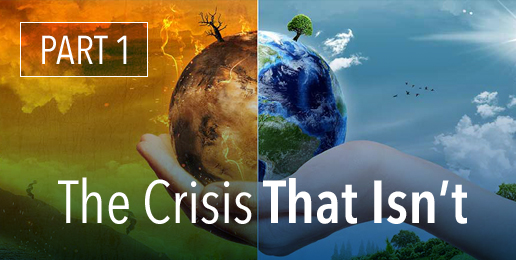
Several years ago, I made a trip to a popular museum in the Seattle area and toured the various exhibits on display.

An exhibit that particularly caught my eye was a kind of vertical conveyor belt on which visitors could post little notes which others could then scroll through and examine. Visitors were instructed to write down their opinion of what the biggest problem in the world was.
As I perused the many notes that had been written by previous visitors, I started to catch some general trends.
Immigration-related issues were a common thread.
There were a few other themes touching on various perceived social or political problems in today’s world. But I still remember the single most commonly-posted concern—climate change. The biggest issue on the minds of the visitors was the future condition of the world’s climate and whether we would successfully do anything about it.
If you’ve spent much time listening to the news over the last few decades, you probably wouldn’t be that surprised to hear the findings of my unofficial poll. The problems ascribed to “climate change” (formerly “global warming,” now rebranded) have earned the powerful “crisis” label in mainstream news, politics, and much of popular discourse.
Pundits clamor their alarms as they predict some new level of ecological harm or civilizational damage that we’re about to incur if we keep hiking up the world’s temperature. Politicians berate each other for not doing enough to stop destructive industrial forces.
Nations get together and come up with strict treaties on how to slow down carbon emissions. And little school children grow up thinking that the world is hurtling toward some scorching termination and it’s all humanity’s fault.
How are Christians supposed to respond to this?
While we are not of the world, we are called to live in it, and living in this world means living amongst a multitude of people for whom climate change is a seriously pressing issue. Many of us will, at some point, have a conversation with an unbeliever for whom this issue is analogous to human depravity in our own worldview: the single biggest curse on humanity from which we’re desperately hoping we find salvation.
Well, as usual, a careful response to a cultural current requires observing the two ditches to avoid and the middle road in between them.
First, we must acknowledge that man has a special charge from God to take care of the environment in which he lives. Think about it this way—what did God say about man before man was even created?
Number one, man was to be in His own image and likeness (Genesis 1:26). Number two, this man was to rule over fish, birds, livestock, and all the earth (Genesis 1:27). In other words, in the Bible’s first stated description of what this new “man” creature was to be like, God determined that this man would be tasked with ruling the created earth.
God then gave this command directly to man once he was created (Genesis 1:28) and put the first man in a garden to take care of it (Genesis 2:15).
Note: The kind of rule God speaks of is not a Stalin-over-the-USSR, despotic rule. While God gives us authority to subdue the earth, He also commands us to be good stewards of it. I believe He expected Adam to be able to present Him with a garden that looked better than it otherwise would have had Adam not been there. And I believe He expects us to approach dominion from the perspective of stewardship as well (Matthew 25:23).
People may still debate about the precise purpose of human existence—whether it was relationship with God, glorification of God, or other similarly important ideals—but wherever you land on the finer points of this discussion, you have to agree on one thing: man’s purpose has something to do with his care over the earth.
We have to agree that—at the very least—it’s not unimportant.
With that basic foundation laid, however, it still needs to be properly clarified and applied to today’s world. We’ll continue this in part 2.






















